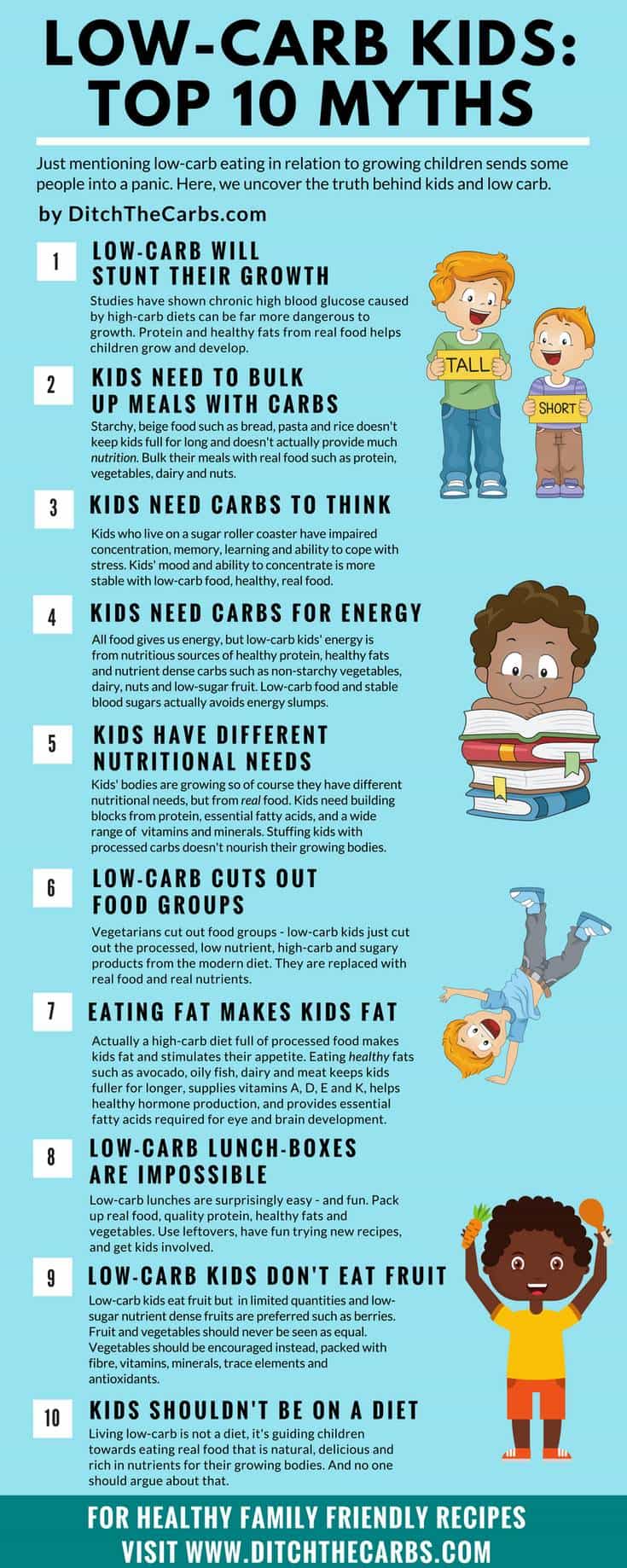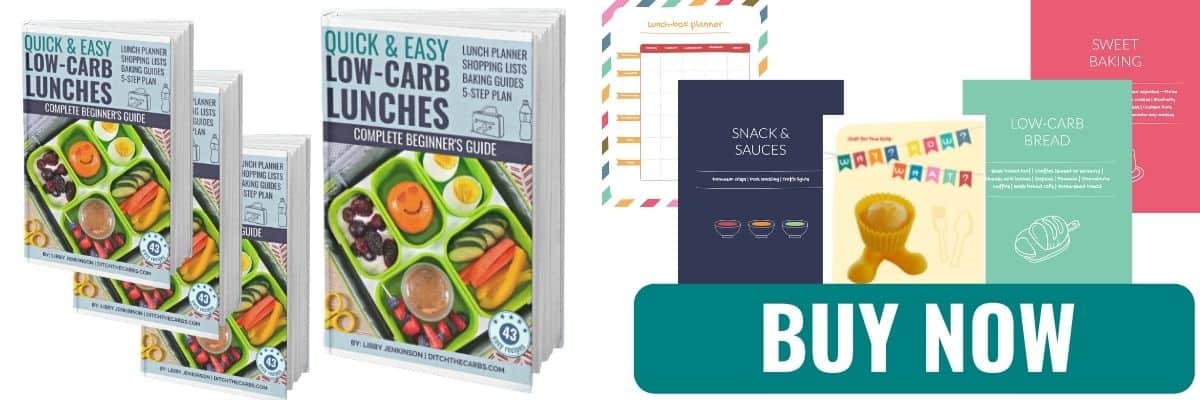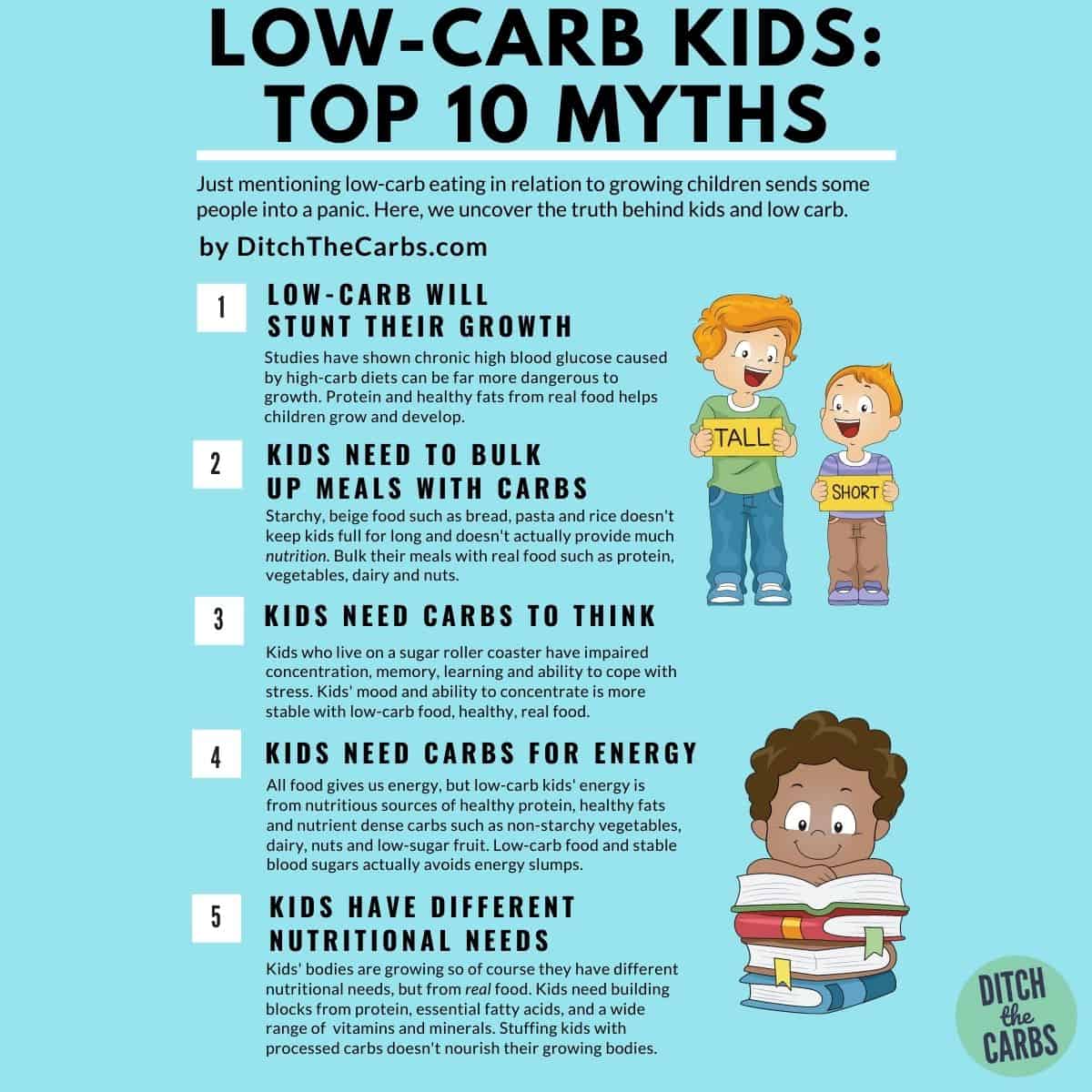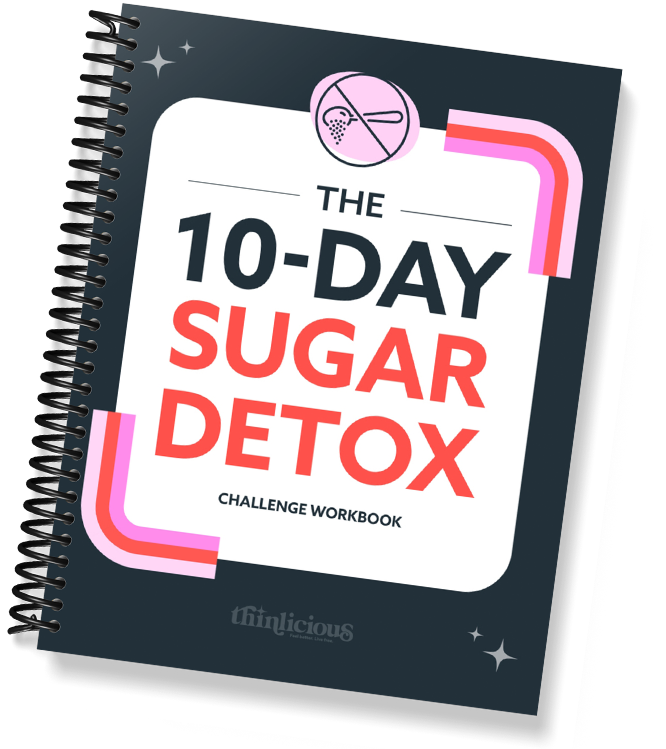Let’s bust the Top 10 Myths About Low-Carb Kids. Because just like adults, all children will reap the rewards from eating real, unprocessed food and cutting down on sugar, wheat, and carbs in general.
And no one should argue with that.

Should kids be lower carb?
Is low-carb or keto safe for kids? What should they eat? Are they nutrient deficient?
The importance of basing meals around starchy food is deeply ingrained in modern culture – and just mentioning low-carb eating in relation to growing kids can send some people into a panic.
Are you ready to lose weight and heal your body for life (without dieting, drugs, or making yourself miserable)?

Our free on-demand video training will walk you through how to make this THE year you set health goals…and keep them.
Surely it means keto kids will be missing out on something essential? Here, we take a closer look at the top ten myths and uncover the truth behind kids and low carb.

Myth #1: Eating low carb will stunt children’s growth

There are no vitamins, minerals and micronutrients in starchy carbs that your kids can’t get elsewhere to feed their growing bodies – and other sources are usually far better quality.
Remember, beige food is nutritionally empty, whereas real food (vegetables, meat, fish, butter, nuts, eggs, some fruit) is packed with what your kids’ bodies need to help them grow.
In fact, studies have shown that chronically elevated blood glucose caused by high-carb diets can be far more dangerous for children’s growth.
Read more: Carbs In Beige Food
Myth #2: Kids will feel hungry if their meals aren’t bulked up with starchy carbs

The “bulking up” theory is one of the favourite arguments against cutting down on carbs, especially for children. But starchy, beige food – the bread, pasta, rice, potatoes etc that are staple ingredients in many households – are often devoid of nutrients.
It’s one of the reasons we are the most overfed but undernourished generation in history. And they may well be bulky, but they don’t keep children full for long.
While kids can often tolerate more carbohydrates than adults, feeding them high-carb food won’t sustain them throughout the day – they’ll experience sugar spikes and sugar crashes, which make them feel much hungrier than they would have done eating real food.
“Two slices of whole wheat bread will raise your blood sugar higher and quicker than 6 teaspoons of sugar” (see video below).
Read more: How everyday foods affect blood sugars
Myth #3: Eating low-carb will mean kids can’t think properly

Much has been written about the brain needing glucose to function – a particular concern when you know your children need to concentrate at school.
However, this is only a half-truth: while certain parts of the brain use glucose as fuel, others function very well on ketones, which are produced when living on a lower-carb diet.
Remember, this is low carb, not “no carb” – and kids get all the carbs they need from nutrient-dense sources such as vegetables, fruit and dairy.
It’s also worth bearing in mind that some recent studies indicate that sugar may actually compromise learning and memory as well as the ability to cope with stress.
Read more: Are you overdosing your kids on sugar?
Myth #4: Kids need carbs for energy

This is a particularly strange myth because all food gives us energy.
High-carb foods do indeed give your kids energy, but it’s short-lived and swiftly followed by a slump and – you’ve guessed it – sugar cravings.
Picky eaters are particularly prone to this, as they often snack and graze on processed foods that are nutritionally lacking, such as flavoured yoghurts, crisps, muesli bars and crackers, and end up skipping proper meals made up of real food.
When you lower the carbs on your kids’ plates, they avoid the high/low blood-sugar rollercoaster – and those energy slumps.
Read more: Kids lunchbox planner
Myth #5: Children have different nutritional requirements

Kids’ bodies are growing, so of course, they have different nutritional needs from adults.
Children need real food.
They need good fats – they keep you full for longer, contain essential fatty acids and supply the fat-soluble vitamins A, D, E and K.
They need protein – which helps build their growing muscles.
And yes, children need carbohydrates – but nowhere near as much as people think. All the carbs and fibre they need can be found in vegetables, fruit and dairy.
Stuffing kids with starchy, stodgy, processed, sugary foods do their bodies no favours at all. The phytic acid in grains have even been shown to hinder the absorption of iron, zinc and calcium, and wheat can reduce blood levels of vitamin D.
There is no deprivation for low-carb kids, they enjoy nutritious, healthy tasty whole food.
More Low-Carb Family-Friendly Recipes …
Myth #6: You mustn’t cut out a whole food group

We’ve said it before, but it’s worth repeating: we are advocating low carb, not “no carb”. No food group is being eliminated.
The biggest sources of carbs should be vegetables, nuts, dairy and berries, rich in vitamins, minerals, fibre and antioxidants.
Children can receive all the nutrients required for their growing bodies without the sugars and carbs of the modern diet.
By crowding out the junk and removing processed food from their diet, and focusing on real, whole food (healthy fats, fresh vegetables and good quality proteins), children become low-carb eaters almost by default.
Read more: How to start low-carb kids
Myth #7: Eating fat makes kids fat

Quite the opposite.
Encouraging overweight children to eat a low-fat, calorie-restricted diet is a big mistake – especially as low-fat products are usually packed with added sugar.
Healthy fats are essential for hormone production, healthy brain function, tissue development, appetite control and absorption of fat-soluble vitamins (A, D, E and K). Children especially need Omega-3 fatty acids for eye and brain development.
Choose olive oil, butter, coconut oil, oily fish, nuts, seeds, eggs and meat, and encourage your children to eat their vegetables by putting butter, grated/shredded cheese, salad dressings and healthy oils on the table. Avoid seed oils, which are inflammatory and incredibly processed.
Read more: What are healthy fats and oils
Myth #8: Low-carb lunch boxes are impossible

Low-carb lunch boxes are surprisingly easy – and fun.
We have all grown up with the traditional sandwich, but is it really a good lunch? The wheat is 80% carbs, which means the kids will be hungry again within an hour, and wheat can cause leaky gut and malabsorption of vitamins.
So forget the bread, which is just a bulky filler, and focus on what you’d usually put inside it. Buy lunch boxes with little compartments, and fill them with real food: cheese cubes, cherry tomatoes, ham, carrots, hard-boiled eggs. Use cold meat, such as roast beef, as a “wrap” and put cheese and vegetables inside.
More Low-Carb Lunchbox Recipes …
Myth #9: Low-carb kids don’t eat fruit

Children need vegetables – they are packed with fibre, vitamins, minerals, trace elements, antioxidants and phytochemicals. But many parents complain their kids won’t touch them, preferring fruit every time.
The problem is, fruit and vegetables should not be seen as equal: fruit is incredibly high in carbs, especially fructose, so it should be limited to only one or two pieces per day (and they should only eat whole fruits, never fruit juice or dried fruits).
Go for lower-sugar fruit such as berries, and cut back on high-sugar tropical fruits such as pineapple and melon.
To encourage kids to eat more veggies instead, there are a few tricks you can try here, including disguising them in the food they do enjoy, flavouring the vegetables with delicious low-carb sauces, and adding butter and cream.
Myth #10: Children shouldn’t be on a diet

Guiding your children towards low-carb eating isn’t about putting your kids on a diet – it’s about eating real food that is natural, delicious and rich in nutrients for their growing bodies. And no one should argue there’s anything unhealthy about that.
How to feed lower-carb kids

If you would like some guidance on raising low-carb kids, take a look at my series of articles on low-carb kids listed at the end of this page.
I will show you how to slowly swap the junk food for nutritious lower-carb food. You will learn how to make low-carb lunch-boxes and how to stop picky eaters (and the one thing you must stop today).
And if you need help with what to feed your children for healthy snack time, these are 50 low-carb and keto kids, snack ideas.
How do carbohydrates impact health?
“Two slices of whole wheat bread will raise your blood sugar higher and quicker than 6 teaspoons of sugar”
Carbohydrate intolerance may take 20 years to develop.
This intolerance will have negative effects on their metabolism and their health. Diseases such as T2 diabetes, hypertension, cancer, Alzheimer’s, heart disease and hormonal issues such as infertility, are all chronic diseases.
They don’t happen overnight, they start developing decades before. It is imperative for the future health of our children to start good nutrition now.
A superb lecture by Dr Austin Jeans.
References:
- Growth Hormones – Normal Growth
- Chronic high blood sugars may be detrimental to the developing brain of young children.
- Growth in Children and Adolescents with Type 1 Diabetes
- Junk food consumption and effects on growth status amongst children.
- Correlation between attention deficit hyperactivity disorder and sugar consumption, quality of diet, and dietary behaviour in school children
- Excessive refined carbohydrates and scarce micronutrients intakes increase inflammatory mediators and insulin resistance in prepubertal and pubertal obese children independently of obesity. “High intake of refined carbohydrates is a risk factor for insulin resistance, independently of central adiposity”.
- Review of risk-factors for growth and development delay
- Low-carbohydrate (low & high-fat) versus high-carbohydrate low-fat diets in the treatment of obesity in adolescents.
- The contribution of school meals and packed lunch to food consumption and nutrient intakes in UK primary school children from a low-income population.
- Breakfast glycaemic index and cognitive function in adolescent school children.
- Nutrition and pubertal development “Nutrition is one of the most important factors affecting pubertal development”.
- Breakfast glycaemic index and cognitive function in adolescent school children.
- Junk Food Is a Feeding Problem Contributing to Poor Growth and Stunting in Egyptian Children
- Nutrient adequacy of low-fat intakes for children “The percentage of calories from carbohydrate, specifically sugar, was greater in the low fat intake group compared with the high fat intake group”.
- Fast-Food Consumption Linked to Lower Test Score Gains in 8th Graders
- Brain foods: the effects of nutrients on brain function. “Diet, exercise and other aspects of our daily interaction with the environment have the potential to alter our brain health and mental function”.
- Effects of carbohydrate counting method on metabolic control in children with type 1 diabetes mellitus.
- Growth and pubertal development in children and adolescents: effects of diet and physical activity. “malnutrition secondary to avoidance of certain foods or malabsorption can lead to serious disorders, such as osteopenia, anaemia, and syndromes related to deficiencies of vitamins, minerals, essential fatty acids and amino acids, and trace elements”.
- WHO – Sugar intake for adults and children
What if you could actually take control of
your health in just 10 days?
It’s not your fault you can’t lose weight as a woman over 40 even though you’ve likely tried literally everything. Your metabolism probably feels broken and your hormones are likely all out of whack.
But you can fix it all with ONE simple change: eliminate sugar. We make it super easy with daily lessons teaching you the science behind what makes us gain weight in our midlife and beyond! Are you ready to get started now?









Excellent post! Thank you!
Love the post. I will refer all the haters to this. My biggest pet peeve is when people tell me I am depriving my daughter of a real childhood! Or how will she ever grow or pick up weight not eating carbs that she NEEDS. We love this lifestyle and know it’s the best one for us as a family. Thank you for always making such great effort with your posts.
I am so glad you enjoyed the article. I think peoples perceptions and preconceived prejudice overrides what we tell them. We are low carb not no carb and our meals are based on whole real food, quality protein, healthy fats and low-carb vegetables and limited fruits. As soon as I discovered LCHF, I knew immediately it was they way I wanted our entire family to eat. Healthy, varied and nutritious.
Yes! Everywhere we go my kids get sugar thrown in their faces! Luckily my son is learning from me that that stuff is not part of a healthy lifestyle and he kindly declines. He loves my low carb chocolate chip cookies!
I know right? My kids are always offered lollipops at the DIY store, the hairdresser, swimming lessons, supermarkets …. I politely say no and ask them not to offer sugar to children. The more we politely tell businesses it is not OK, they might get the message and a mind shift might occur.
Great post Libby …
I so agree with your words – I’ve repeated them! LOL!
“We are low carb not no carb and our meals are based on whole real food, quality protein, healthy fats and low-carb vegetables and limited fruits”
So “Healthy, varied and nutritious”
Seriously our grand-kids are lower carb, not to the same extent as me and husband Eddie, but they are thriving on it. It is just so great to see them eating their vegetables like broccoli, one of their favourites.
Keep up your great work
All the best Jan
So many people think we are feeding our kids on some weird restrictive diet, nothing could be further from the truth. They eat a variety of meat, fish, vegetables, nuts, seeds, berries, healthy fats and full fat dairy. What they are missing out on is processed, nutrient empty, processed food. There should be nothing controversial about that. And yes, my kids are higher carb than me but definitely low carb compared to their friends.
I love this post!!! Thank you!
I’m a teacher in High School. I always tell parents that the low (almost no) fat diet that the school is paid to offer isn’t good enough for their kids. The human brain is over 65% fat (fatty acids) and you can’t substitute sugar for those fats. You can’t grow a good brain on sugar, and you can’t grow a brain with out lots of quality fats.
The school lunch program is 80-90% sugars and carbs. No wonder we are raising insulin resistant, diabetic, overweight kids. They have no choices.
k
That’s a really good graphic. I wish I could fling them about at a school function.
Now that I would love to see 😉
I like the article in general. Thank you for taking the time. I have just two comments:
1) On the graphic number 6 Low-Carb cuts out food groups; a counter argument “Vegetarians cut out food groups” is used. This is confusing to people. Let’s be clear, this is about macro-nutrients: protein, carbohydrate, fat. Vegetarians don’t cut out macro-nutrients.
2) Low-Carb Kids is not a good title. Vegetables are full of carbohydrates and you advocate eating them. What you perhaps should call it is Low-Calorie-Carb Kids – because that is exactly what you are advocating which I agree with 100%. Whilst a vegetable and a sugary snack are both (as a %age) high carbohydrate, the sugary snack has many more calories (as do most processed and packaged carbohydrates). Therefore, filling up on lots of veggies provides far fewer calories than filling up on junk.
Alistair I agree with you in part. 1) I talk about vegetarians cutting our food groups not cutting out macro-nutrients. This is where there is confusion. People don’t distinguish properly the difference between a food group (vegetarians) and a macro nutrient (low-carb). 2) We are by no means low calorie. My kids amp up their healthy fats to keep them satiated so they don’t require to snack on junk. They perhaps consume the same or more calories than most kids but from nutrient dense real food, rather than nutrient devoid junk food which does nothing to fuel their growing bodies. I have never counted calories or carbs for my children, that is not my focus. My focus is on nutrient dense unprocessed foods, lower in carbs, higher in healthy fats. Great points to discuss Alistair. Thank-you.
Libby,
What is your thoughts on the new Low Carb Bread from Aldi?
My kids love it.
It is also a great problem at school when they only have a limited time to eat, so my lot only want a sandwich.
I am limited too as a student has egg allergies. My kids both love boiled eggs.
Aleisha
I’m afraid we don’t have an Aldi here in NZ so I can’t comment. Take a look at the ingredients and see if they are what you and your family can tolerate, and look at the carb count. It may work in with how strict/liberal you need to be. Do what works for you and your children. And remember it’s what you do every day that counts, and ensure it is packed with yummy nutritious whole food, then the bread (sorry again I cant take a look at it) will actually be less of an issue in the entire lunch.
I truly love your post (website) and would like to purchase your poster, Low Carb Kids; Top 10 Myths (or print a high quality copy from a pdf) for my office – I’m a speech language developmental specialist … trying to incorporate healthier food choices and educate parents of the young children I serve. Any suggestions?
I would be honoured if you printed it for your office. I have created it in high quality for you and added a link below the image and you can also click here for the full quality PDF. For more resources, I have a list at the bottom of this post which can help parents change their children onto whole food and lower-carb foods.
Omg!
Thank god i’ve found your website. Been in keto for 4 months last year, and trying to get back to it now (old habits die hard lol)
Now we’re expecring our first baby, due sept. And i trully believe keto is the way to go! All i gotta do is convince my wife and the rest of my family, but ur content gives me knowledge and motivation to move forward!
Havent read everything cause theres so much content, but kudos for the awesome job.
Greetings from Brazil
Eduardo
I’ve read your blog for a couple years and I love the idea of it. But my husband is a weight lifter, and 4 of my 5 kids are athletes. Is there any concern for eating low carb for young athletes? And if not, what are the best recommendations for low cost snacks to help with cravings. Teen and tween boys, and athletes get HUNGRY! I’d love to feed them healthier without breaking the bank, or spend all my time in the kitchen! Thanks in advance.